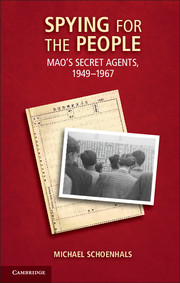6 - Training and Tradecraft
Behind the Covert Front
Published online by Cambridge University Press: 05 January 2013
Summary
In its editorials, the People's Daily in the 1950s came down hard on those unnamed “members of our revolutionary ranks” who failed to appreciate the supreme importance of having the correct political stance. More or less by default, PRC news media attributed the operational successes of public security organs to the superior political qualities of the men and women involved. Behind closed doors, however, senior public security officers assessed somewhat differently the relative importance of politics and professionalism – or the qualities of “redness” and “expertise,” as they were also known. “Talking about politics day in and day out is not going to put food on your table!” Shanghai's director of public security impressed upon his subordinates in 1959. Operational officers, he emphasized, also had to develop the requisite professional skills and tradecraft: in the words of a British writer on the ethics of the subject, the “arts of deception.”
Nobody was more fully aware than the CMPS leadership of the fact that, in reality, the victories that officers and their agents scored on the covert front had everything to do with first-rate tradecraft. During his tenure as minister, Luo Ruiqing made the development and improvement of professional skills among his officers a priority: “We not only need to master primitive forms of struggle,” he noted specifically in his 1953 New Year's address, “but in particular need to master sophisticated forms of struggle.” Three years earlier, in 1950, Wang Jinxiang had told operational officers:
You need to conduct research into the techniques of where, when, and how you meet with your agent and how to ensure you will not be spotted by the enemy. Otherwise, the result of just a moment's carelessness, a breach of security, may well be that all your running and cultivation of the agent will have been wasted and your work will have been compromised.
- Type
- Chapter
- Information
- Spying for the PeopleMao's Secret Agents, 1949–1967, pp. 170 - 204Publisher: Cambridge University PressPrint publication year: 2013

